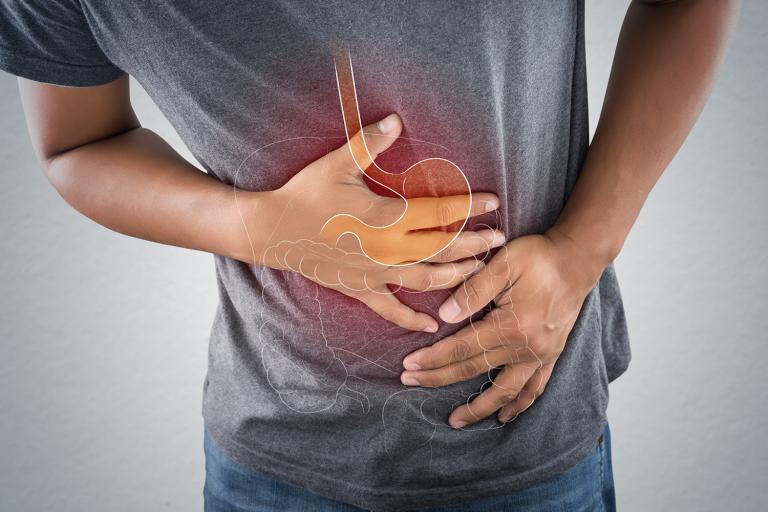Gastroesophageal reflux disease (GERD), also called hiatal hernia or acid reflux disease, is caused by stomach acid squirting up from the stomach into the food pipe (esophagus). This causes heartburn, reflux, or backup of acid into your throat or coughing and choking. It can get worse at night as gravity is no longer helping to keep food in your stomach. If you inhale the acid while asleep, it can also cause night sweats and worsen asthma or bronchitis.
Having stomach acid is both necessary and normal. Your body needs to have proper nutrition, however, to make the mucous lining that protects the stomach. Instead of giving your stomach what it needs to heal, we sometimes make the mistake of turning off stomach acid to solve the problem.
The Problem with Acid Blockers
Though turning off stomach acid helps you feel better in the short term, acid blockers used for more than two months can be dangerous and addictive.
If overused, they can result in osteoporosis, poor nutrient absorption, and nutritional deficiencies. Acid blockers have also been shown to cause massive rebound acid secretion when you stop them. Wean off of them gradually.
Consider Plant-Based Digestive Enzymes
Most of the enzymes we need to digest the food we eat are naturally present in food. Enzymes are what a fruit or vegetable uses to ripen. Many years ago, food processors realized they could prolong the shelf life of food from days to years by destroying the enzymes in the food. Because of this, most enzymes have been eliminated from processed foods over the last few decades. This corresponds to the period of time in which we have seen a dramatic increase in degenerative diseases and indigestion.
When you can’t digest food properly, the acid starts to reflux up into your chest and you get burning in your solar plexus (just below the bottom of your ribs) and mid chest (called indigestion or “acid reflux”). Food should be past the stomach less than an hour after eating it. If you’re still tasting what you ate over an hour ago when you burp or have acid reflux, you’re not digesting properly and should take digestive enzymes.
Recommended Supplements
In addition to plant-based digestive enzymes, consider the following:
- For immediate heartburn relief, instead of plain calcium antacids, which can increase heart attack risk, try chewables that also contain magnesium and vitamins D and K to protect the heart. The mineral magnesium has a side benefit of easing constipation.
- Try licorice tablets before meals. Slippery elm and the herb marshmallow also support the stomach lining.
- Mastic gum, 1,000 milligrams twice a day for one to two months, can kill an H. Pylori indigestioncausing infection in the stomach and may help heal the stomach’s natural protective lining.
- Enteric-coated probiotics can promote healthy digestion and improve nutrient absorption.
Other Lifestyle Tips
- Avoid drinking cold drinks with meals. Cold temps inactivate digestive enzymes.
- Being overweight can aggravate daytime acid reflux. Maintain a normal weight. Losing even five to ten pounds can help.
- Don’t eat within two hours before bedtime and take a plant-based digestive enzyme an hour before bed. This will ensure your stomach is empty when you sleep.
- If certain foods cause indigestion, don’t eat them. Food allergies can be eliminated with NAET.
For Night-Time Reflux
- Take 1⁄2 teaspoon of bicarbonate of soda in 4 ounces of water at bedtime to neutralize the acid in your stomach (not for children under 16). If you have high blood pressure, use food-grade potassium bicarbonate.
- Sleep with your upper body elevated at least 6 to 8 inches.
- Taking 5 to 6 milligrams of melatonin at bedtime can decrease reflux.

